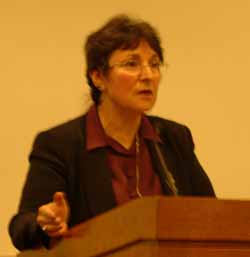Laraine Masters Glidden: Fourth Blackman Lecturer
When one or more children with disabilities are part of a family, how does it affect family life? That is what Laraine Masters Glidden hoped to determine through her research, which she presented at the fourth Leonard and Frances Blackman Lecture in April.
Glidden, who 30 years ago worked as a Research Associate for Professor Emeritus Leonard Blackman when he was on the faculty at Teachers College, presented her research, "Positive Psychology and Rearing Children with Developmental Disabilities: Still Happy after All These Years?" to members of the TC community. Glidden is currently Professor and Chair of the Department of Psychology at St. Mary's College of Maryland, and serves as President of Division 33, the Division on Mental Retardation and Developmental Disabilities of the American Psychological Association.
Glidden, who has written about families that adopt children with mental retardation, said that she began to notice that personal narratives of families having children with disabilities were not comparable to the empirical literature on family adjustment and outcomes. The research indicated that the "stresses imposed far outweighed any benefit," she said.
By 1993, she noticed a shift. "There has been a change in how we think about people with mental retardation and the services available to them and their families," she explained.
Glidden's study looked at 249 families in the United States, half of whom adopted children with developmental disabilities, and half of whom were the birth families of these children.
The difference between the two types of families is that for birth families, the situation is, for the most part, unexpected. "They have to deal with what it means to be a parent of a child with disabilities," she said. Adoptive families knew in advance they would be taking on this responsibility.
Researchers came into the study when the children were approximately 6½ years old, what was considered Time 2 out of a total of four time segments for the families. Time 1 began at the time the child came into the family or when they received the diagnosis of a disability.
Three hypotheses were considered. The first was that adoptive parents would, at the beginning, show better initial adjustment than birth parents.
This was confirmed by four times the number of birth mothers reporting depression than did adoptive parents at the time of diagnosis or the child's entry into the family. In tests that looked at existential crisis or the emotional strain at the time of placement or diagnosis, adoptive mothers showed much less crisis than birth mothers.
The second hypothesis speculated that the researchers would see little difference between adoptive and birth parents in Times 2, 3 and 4. To make this determination, researchers looked at levels of subjective well-being-feelings in general, feelings with respect to the child with the disability, and current feelings. They also looked at how "hassled" they felt in rearing a child with a disability.
There was not much difference between the two groups regarding subjective well-being except in birth fathers at Time 4, the time when the children were making the transition into adulthood. Overall, mothers showed no significant differences on any of the measurements. Birth fathers, however, seemed to endure fewer rewards and aspirations and showed more worries than adoptive fathers did.
The third hypothesis looked at what traits account for levels of adaptation and adjustment, and whether personality influences adjustment and coping for both birth and adoptive parents. Five personality factors were measured-neuroticism, extraversion, openness, agreeableness, and conscientiousness. Neuroticism, which looks at how one feels about his or her life and how one feels about someone else, was a significant predictor in how the family was able to adjust and cope with the situation. Extraversion, which measures positive orientation towards life, also played a role.
"People who are generally optimistic and positive would have more feelings of reward with regard to how their child is making a transition and how the child will do in the future," Glidden said.
Although the data from Time 4 is still being evaluated, the study indicates that parents rearing children with disabilities report many positive outcomes, she said. "We need to study strength and resilience as much as stress and burden. We must learn to promote the positive as well as prevent the negative."
Published Thursday, May. 1, 2003
